April 21st 2023, Llano, Texas.
Most everything you need to know about Llano can be found in Fuel Cafe on East Main Street. What is seen and unseen, what is spoken and what is not spoken about. The cafe’s motto — coffee + music + community — sums up how it, and indeed much of Lleno, sees itself. But probably more than anything else, it is about community. This is small town America, big time. It is small town Texas Hill Country.
Llano is a county and town about an hour and a half north-west of Austin, the university city and, increasingly, the IT heart of Texas, growing ever more so as tech companies invest in the city, with the knock-on effect of staff moving there, and getting a lot more bang for their property dollars then in, say, California. One of the more recent movers is Elon Musk’s Tesla. In just one year to the end of 2022, the company more than tripled its workforce to over 12,000 at what is now the company’s headquarters. Llano’s a long way from all that, however.
Typical of many very small towns across the United States, Llano regards itself as a city, and indeed calls itself one. “City of Lleno”, says the town’s official website. Welcome to Llano, say road signs, population 3,232. The town is situated at the intersection of two main roads, route 16 which goes north/south, and route 29, which goes east/west. It is bisected also by the Llano river which has been dammed cleverly at a number of points along its flow thereby creating large pools for fish and birds, and on the banks of which are public parks.
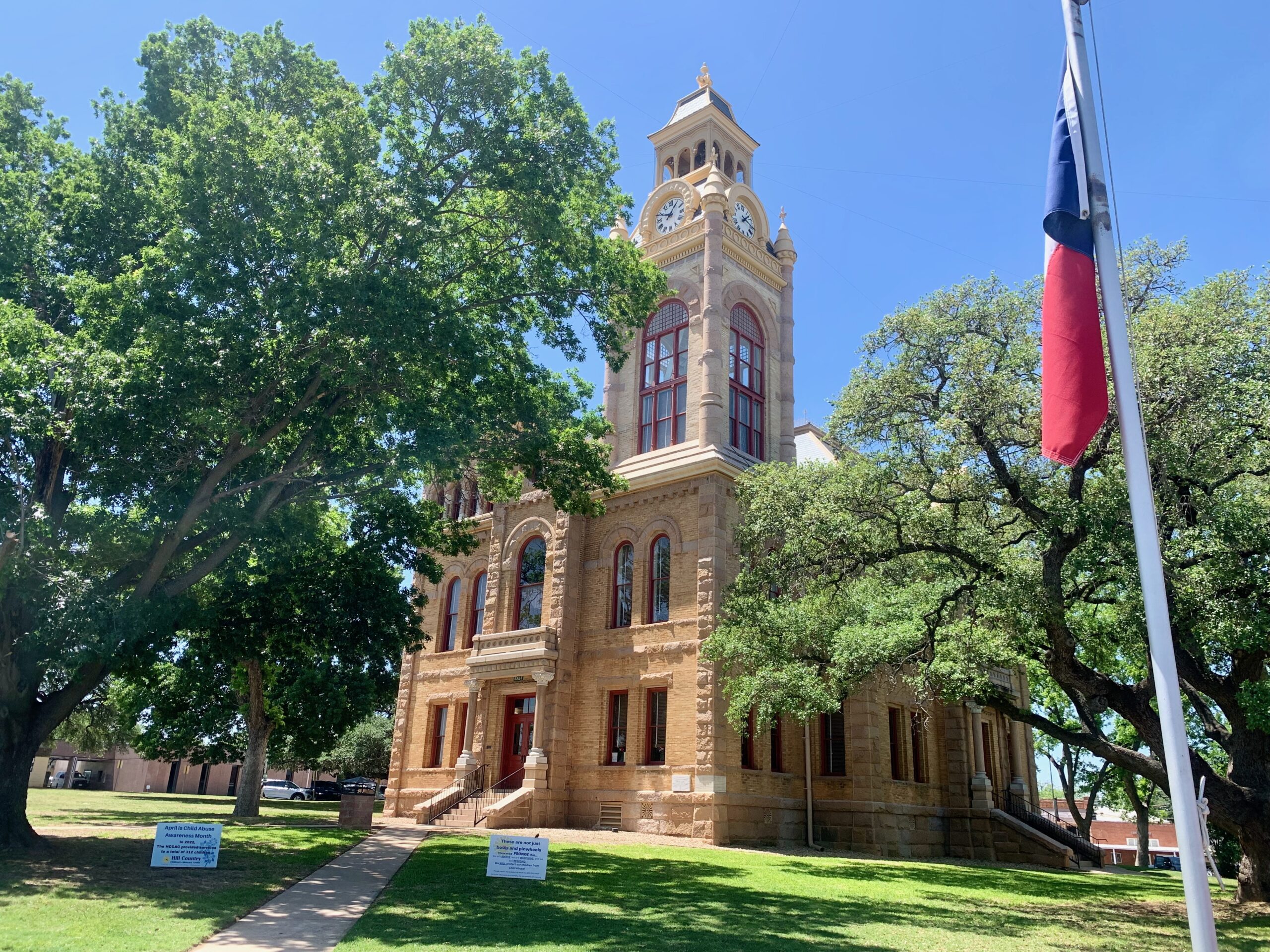
Fuel Cafe is just by the corner of Llano’s Main and Ford, as Highway 16 is known while it progresses through the town. And around the corner from it is the town’s main square, Courthouse Square, in the centre of which is Llano County Courthouse, which dates from 1893 — ancient in US terms. It is a fine Victorian building, the sort that in Belfast, or parts of northern England might have been the home or vanity project of a mill or a mine owner, or a ship-building magnate. It is three stories high and has a clock tower and bell. All the windows are tall and elegant. The building is made of red brick, sandstone, marble and pink granite; it oozes solidity, strength and, set centre in a well-kept lawn, has about it an aura of centrality and permanence. Which is just as well as it has survived fires in 1932 and 1952 only to be lovingly restored after each.
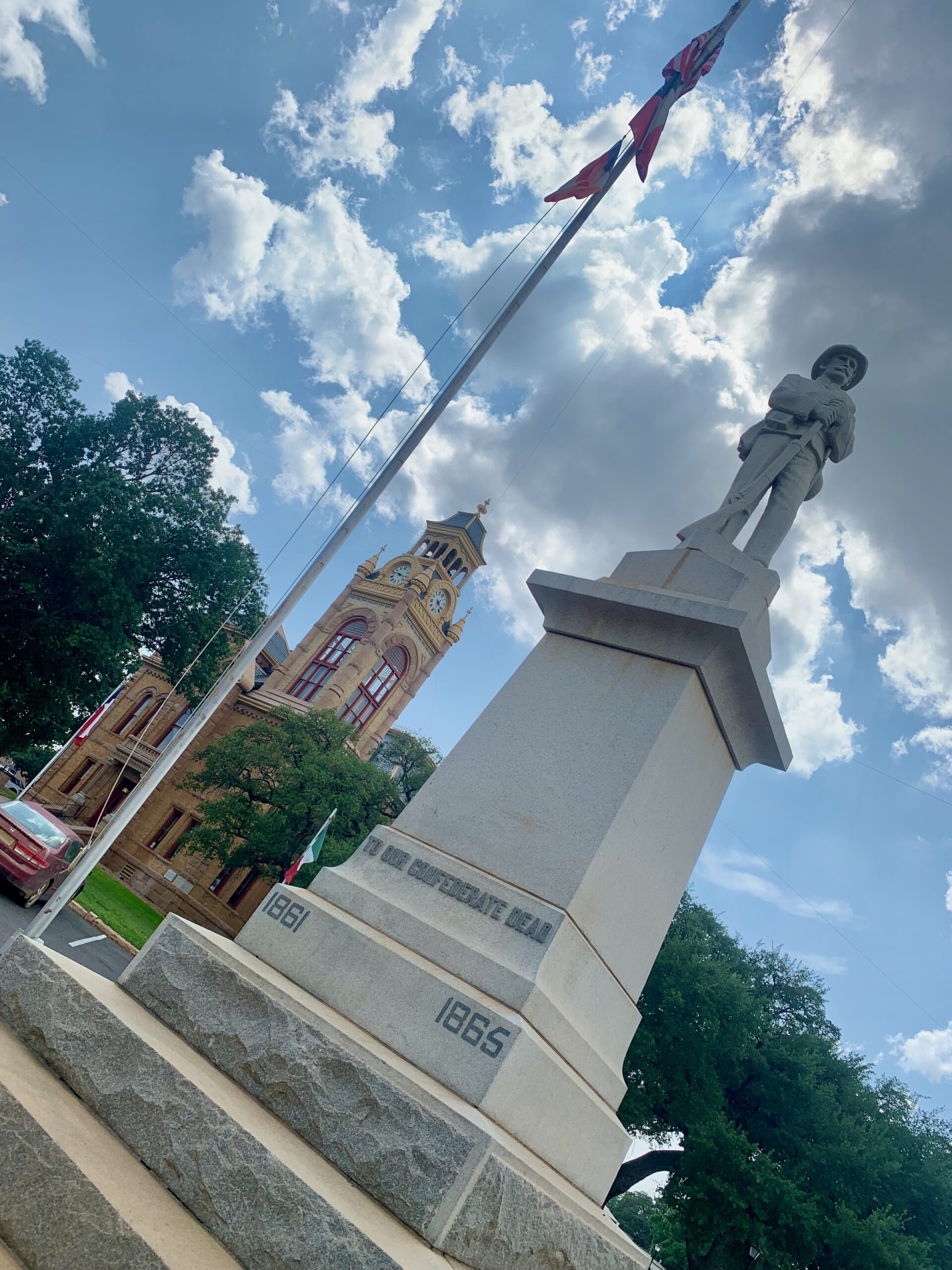
At one corner of the courthouse lawn, there’s a statue to those from the town who lost their lives in the first World War. At another, there’s a statue of a soldier from an earlier era and the message on the plinth: To Our Confederate Dead 1861 — 1865.
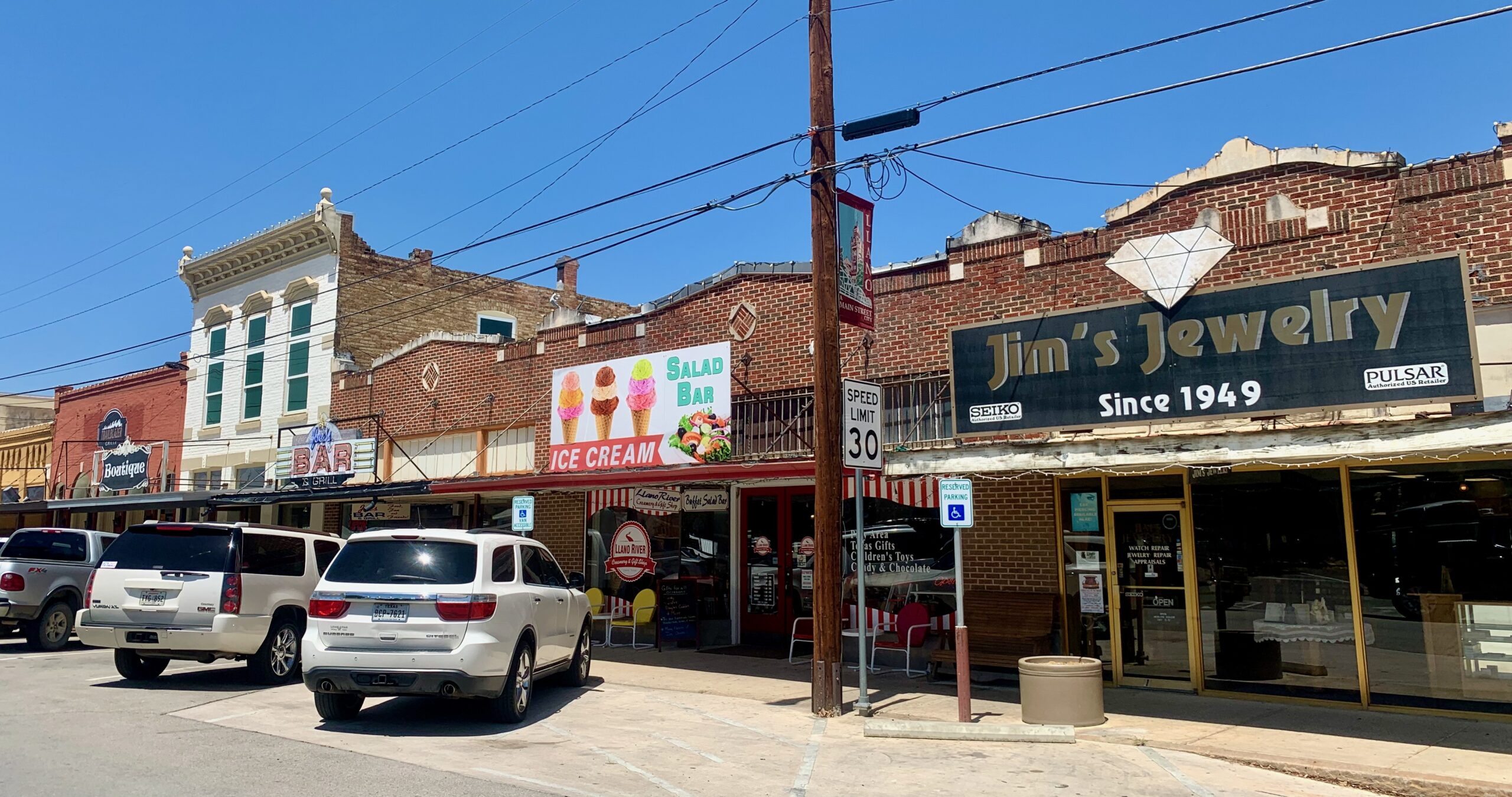
Two sides of the square, on the far side of typically wide roads with nose-to-kerb parking spaces, are dominated by official buildings, some associated with the County Courthouse, which is really now the HQ of the county judge. There’s the Courthouse Annex and a bank, for instance, the District Attorney’s Office, the Post Office, a local paper (The Llano News) and some private businesses, including LTX Mercantile and a souvenir store, Enchanted Rocks. On another side of the square there’s the Lan-Tex Theatre (No movies this week, says a sad sign), Jim’s Jewellery, Joe’s Bar and Gio’s Italian Restaurant. The final side of the square is dominated by Charlie’s Gift Shop and Trendz Old and New.
In Joe’s, they’re typically friendly to a visitor. Locals Gene and Ashley happily pose for a photo with Rachel the barmaid and thank this visitor for coming to their town.
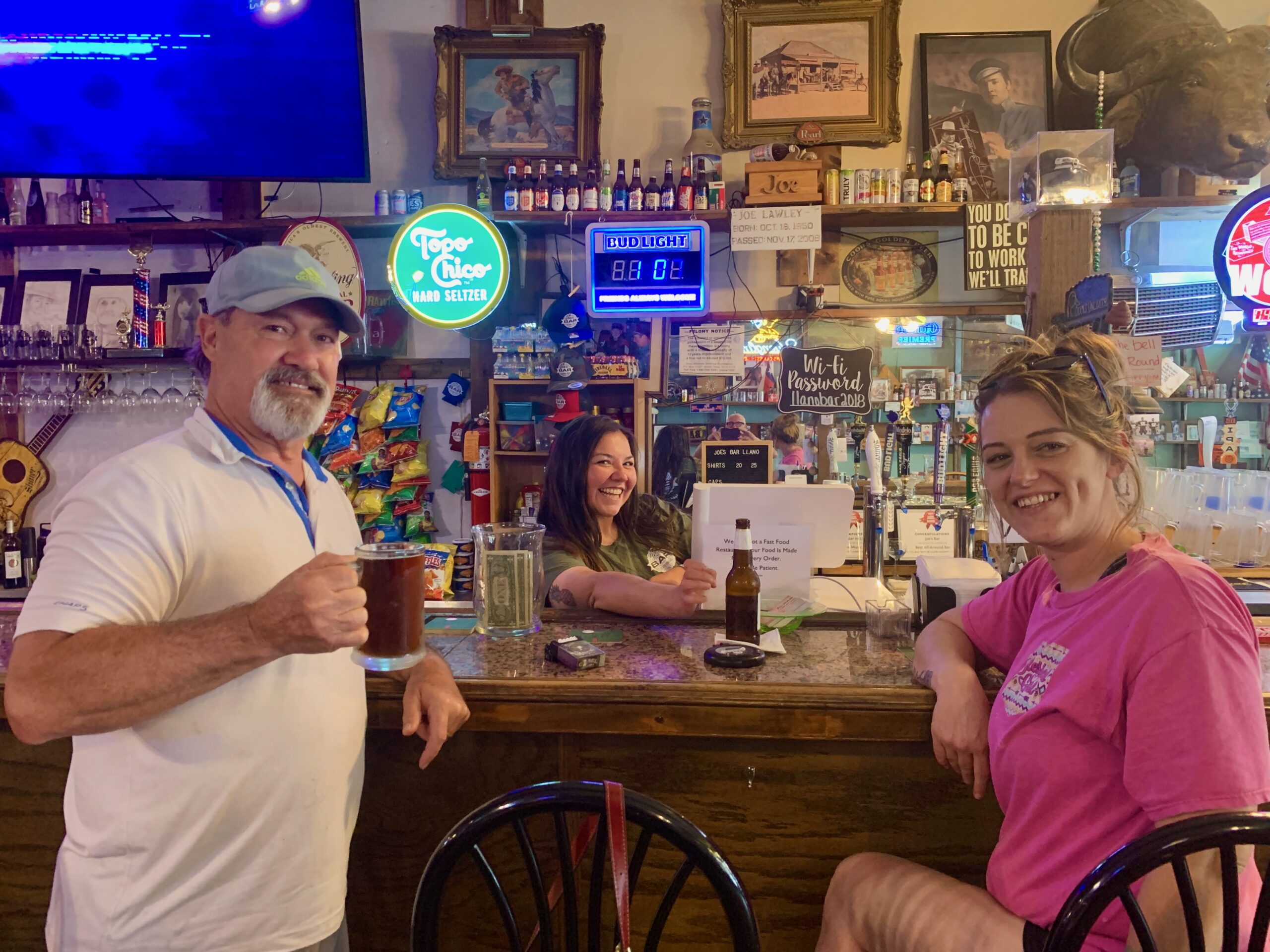
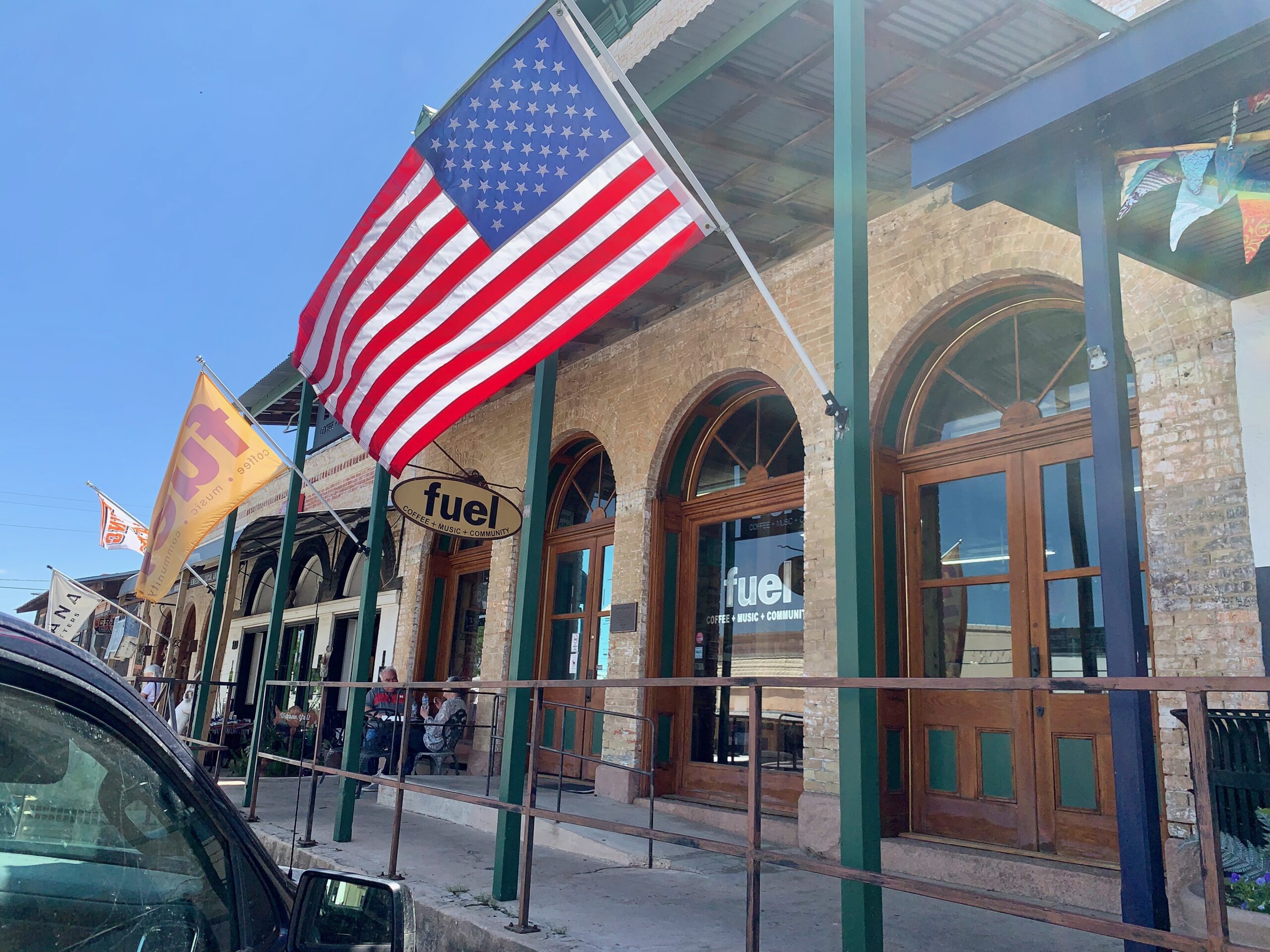
Fuel Cafe is just around the corner from all that. It used to be a grocery store and the tall, glass panelled entrance door still has what looks like its original well-worn, thumb latch to open it. Inside, the floor is rough pine. It’s easy to imagine when there were open wooden boxes of seeds and pulses, displays of vegetables and shelves stacked high with tinned goods. The walls are exposed stone rubble and the ceiling is high and also timber clad. A small handmade sign hangs on one of several timber clad pillars in the centre of the cafe. God Bless Our Llano, it says. God and simple, feel-good philosophy is never far away in Llano. Today Is A Good Day, says another sign in the cafe.
And indeed it is.
On the left as one enters there’s a day-by-day noticeboard detailing in chalk the activities to which Fuel Cafe plays host. The Knitting Group has Mondays sown up. Other days promise music and there’s mention also of jam and “puddles”, about which I can tell no more.
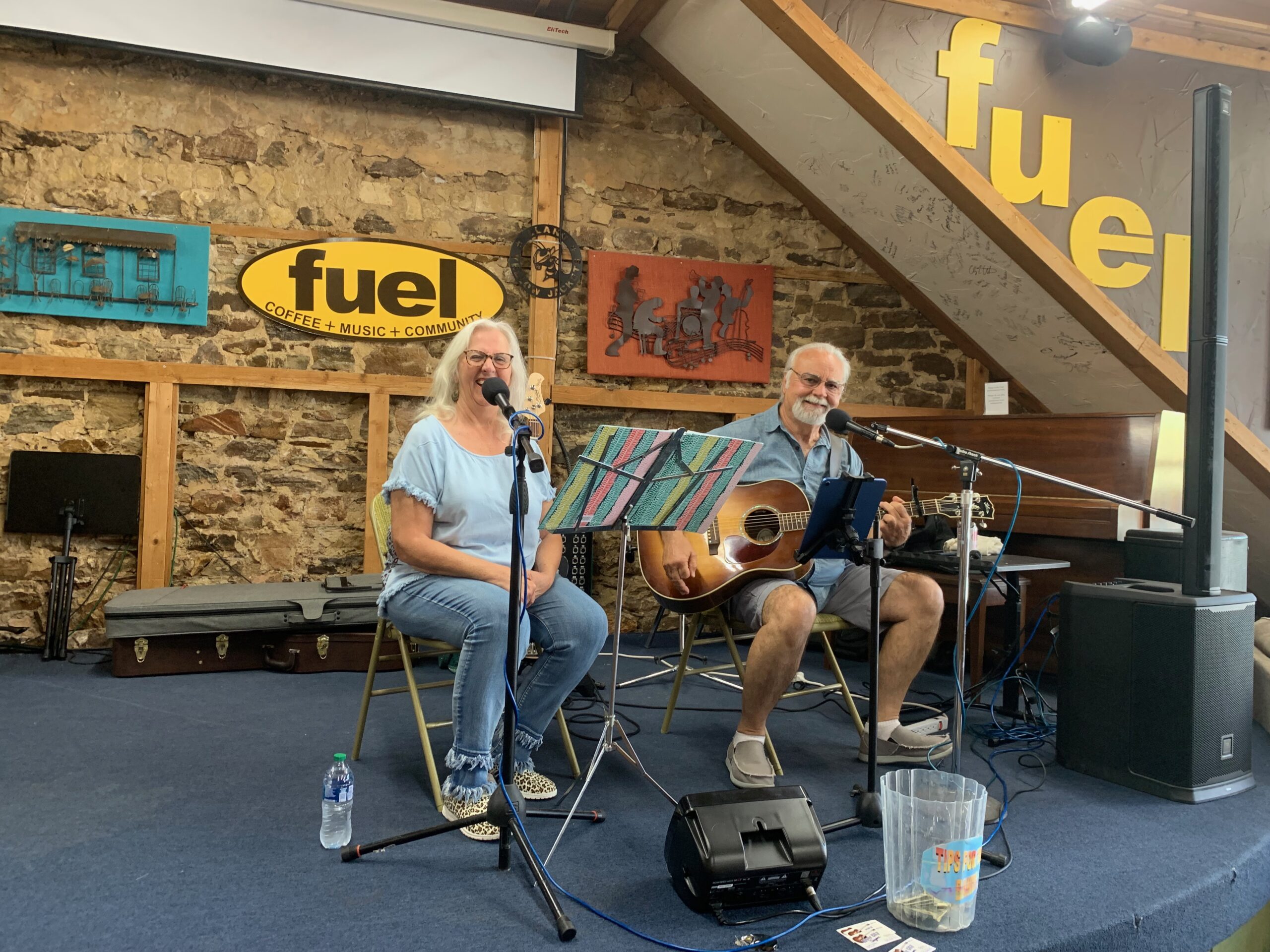
Music is a major part of life at Fuel Cafe and, when I enter, there on stage over to the right are Emmet and Debbie McPherson, gently singing soothing middle-of-the-road Country and Western songs. Both are late middle aged but absolutely full of life and charm. Debbie, a good-looking woman in blue jeans and a blouse, smiles easily and exudes great warmth. Emmet, equally well-preserved and also with a welcoming personality, wears a casual shirt and shorts and strums the guitar. They interrupt their singing to say hi everyone that enters, often greeting them by by name. Their harmonies include lots of John Prine and old time C&W favourites — frequently mournful ballads lamenting love lost or never won, thwarted by insurmountable obstacles, like prior marriage to another. They sang Jim Reeves’ Don’t Let Me Cross Over.
I’m tempted my darling to steal you away
So help me, darling, stay out of my way
You know that I love you but I’m not the cheating kind
I’m faced with a heartache at love’s cheating line
Don’t let me cross over love’s cheating line
You belong to another and you’ll never be mine . . .
And then When Two Worlds Collide, another Reeves classic.
Your world was so different
From mine, don’t you see?
We just couldn’t be close
Though we tried
We both reached for heavens
But ours weren’t the same
That’s what happens
When two worlds collide . . .
I’d say everyone in the cafe knew every word of every song Emmet and Debbie sang. The listeners certainly all knew each other.
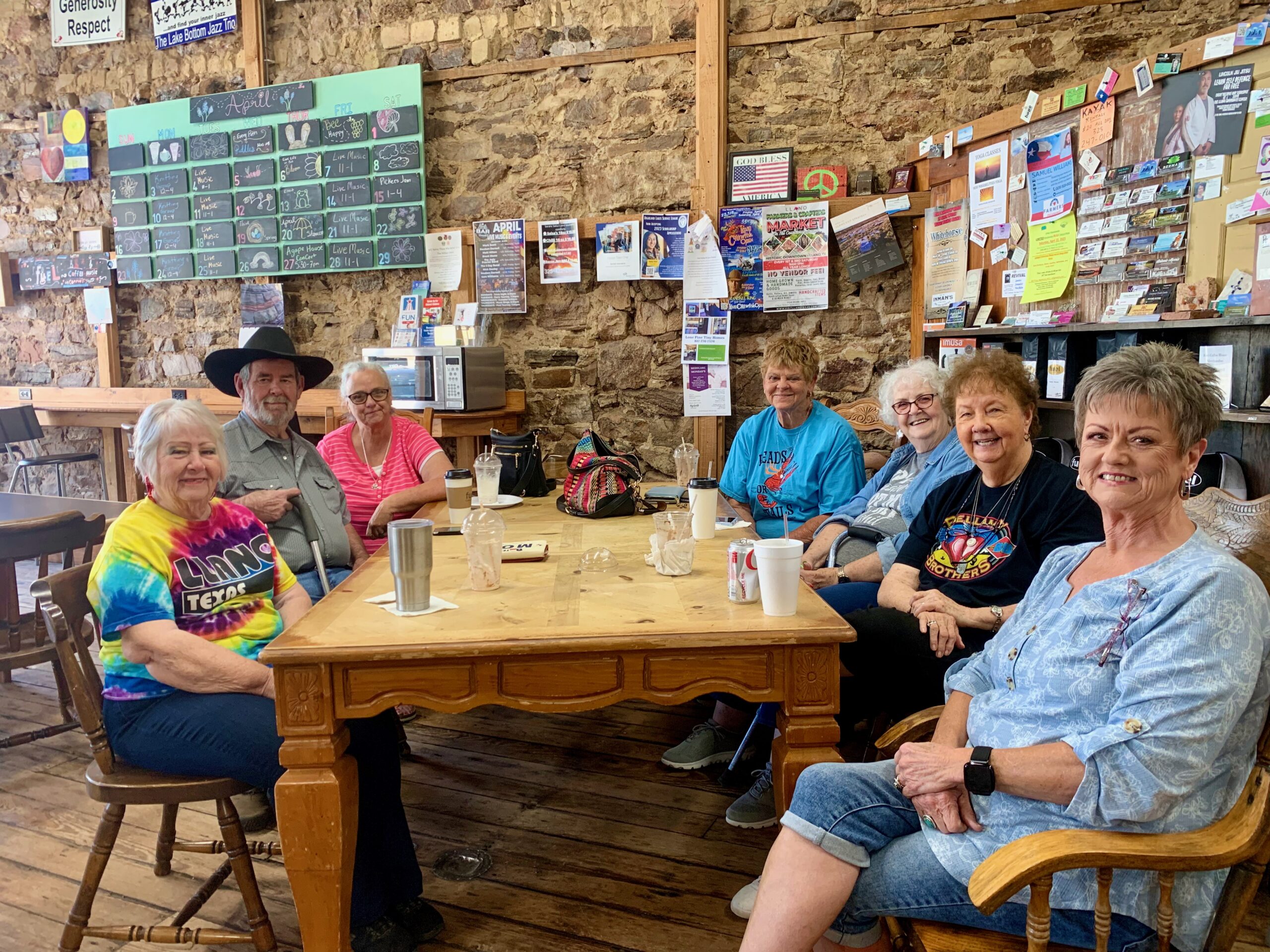
A late middle aged lady in a white blouse bounced in through the latch door and threw her arms around a similarly aged woman in a tie-dye blouse. “Well gurl! How you doin’?” she asked her. Tie dye was sitting at a long table with half a dozen other ladies — and one Stetson-wearing feller with a walking stick and lumber pain. The scene had all the hallmarks of a regular morning coffee get-together where family and community news was swopped eagerly and ne’er a harsh word spoken about anyone absent.
I was wearing one of my Tip2Top trophy tee-shirts. “Galapagos!” exclaimed one of the ladies, “You been to the Galapagos?” Yes, I said, I had. “Oh, I so wanted to go there,” she replied. “I was in Peru but we never got to the Galapagos.” One of the ladies had relatives in Co Antrim, another in Cork. Family members had been to Ireland.
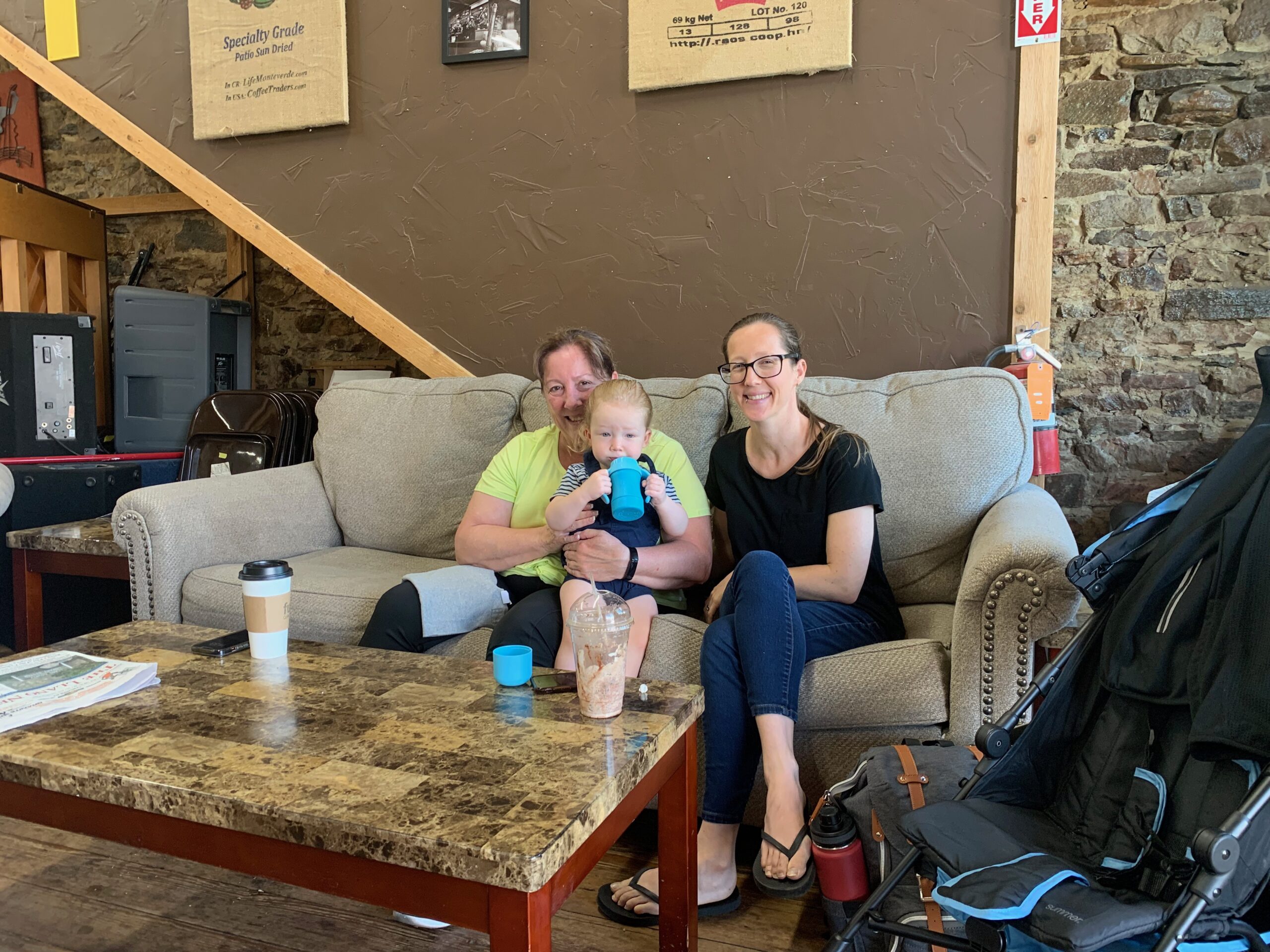
On the other side of the cafe, between the stage and the window, were two big old arm chairs, the type that embrace you as you sink into them and quickly don’t want to leave. An older Mum, what looked like her daughter and the daughter’s toddler were there chatting easily, just like they were at home. Several other people were reading newspapers. No one was on a mobile phone. It was all coffee, music and community, just like the sign said.
But beneath the surface, something has been stirring in Llano that is far from harmonious and it was this that drew me initially to the place. This tiny town is at the centre of a row that has split the community and is emblematic of the so-called culture wars that have broken out all over the US and are tearing at the fabric of social cohesion. At issue in this instance are 17 books which staff in the local library — just around another corner from Fuel Cafe — say they removed from shelves because no one was reading them and they needed to free up space. However, opponents claim that the books were removed in an act of censorship and at the behest of conservative forces operating increasingly at almost every level in US society — across government, in national and local politics, within community organisations, in schools, and in the judiciary — from Washington DC all the way to your local small town library board.
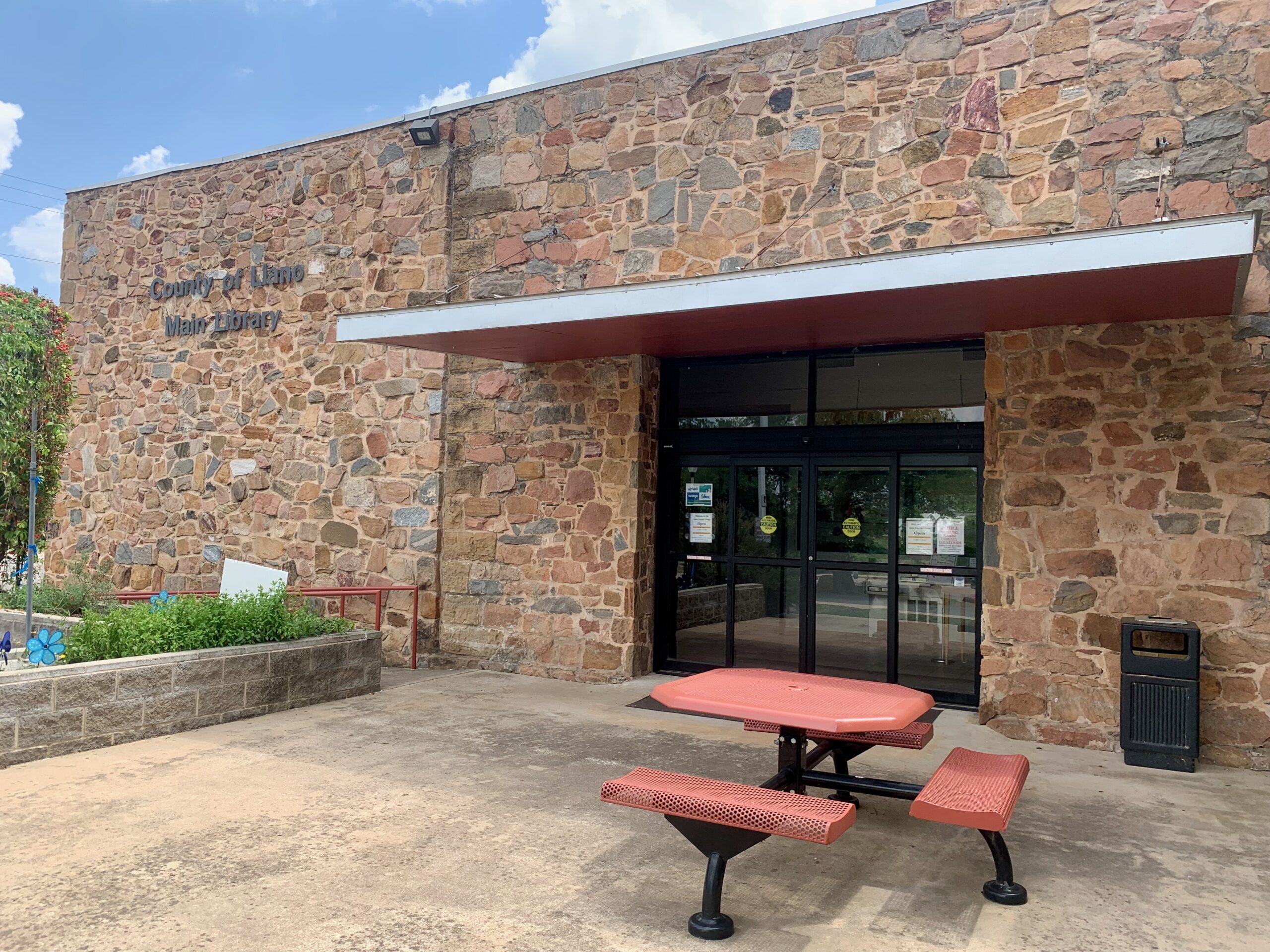
Library staff in Llano see themselves caught in the middle of a horrible war that has now reached the federal courts and could well go all the way to the US Supreme Court.
“It’s been brutal,” says Richard Lelle, a middle aged and wholly mild-mannered member of Llano’s library staff. “Guy the other day called me Ay-dolf.”
The precise origins of the conflict are difficult to discern but here’s what I know.
Last Spring, library staff working to the director Amber Milum, removed 17 books from the open shelves. The books are: Caste: the origins of our discontent by journalist Isabel Wilkerson. It examines the origins of racism in the US and argues that American society is, essentially, a caste system. They Call Themselves the KKK – the birth of an American terrorist group by children’s author Susan Campbell Bartoletti. It has won an award for excellence in non-fiction for young adults. Being Jazz: my life as a (transgender) teen by Jazz Jennings. Spinning by Tillie Walden is a novel memoir in which the 10 year old protagonist describes a regime of romance, bullying and trauma as they try to be a figure skater.
In the Night Kitchen by Maurice Sendak is about a young boy’s dream journey during which he falls into a giant pot filled with cake mix. Critics claim there is undue attention to the child’s nakedness and allege sexual innuendo. It’s Perfectly Normal: changing bodies, growing up, sex and sexual health by Robie H Harris. The book aims to inform preadolescent children about puberty but has been attacked for allegedly giving age inappropriate information about homosexuality and abortion, among other matters.
Shine by Lauren Myracle is about a teenage girl investigating a hate crime. Previous books by Myracle have been banned, notably in Utah, for their alleged prurient interest in sex. Under The Moon: a Catwoman tale, also by Lauren Myracle, is a graphic novel involving domestic violence. In Gabi, a girl in pieces by Isabel Quintero, the protagonist tells her diary about her last year in high school in which Cindy becomes pregnant, Sebastian comes out, and the protagonist dwells on her father’s meth habit, and the food she craves. Freakboy by Kristin Elizabeth Clark is a novel in verse about a genderqueer teenager, the teen’s girlfriend and a trans woman.
The final seven books are ones I imagine would have pre-teens giggling at the naughtiness of it all. They are My Butt is so Noisy!, I broke my Butt, and I need a new Butt all by Dawn McMillan, and Larry the Farting Leprechaun, Gary the Goose and His Gas on the Loose, Freddie the Farting Snowman, and Harvey the Heart Has Too Many Farts, all by Jane Bexley.
One doesn’t have to be Sherlock Holmes to see a pattern in that list. Could this really be a random selection, the aim of which was to remove unborrowed books to free up shelf space? Library director Milum insists that is exactly what happened.
“At the beginning,” she told me, “we did it because some books weren’t being checked out [that is, borrowed]. If they aren’t getting checked out, it’s a normal process we keep doing. We didn’t think anything about it.”
Was it coincidental that, excluding the seven farting books, all but two that library staff decided to remove (Night Kitchen and Under the Moon) were also on a list of no fewer than 850 books compiled by a conservative Texas lawmaker, Republican Matt Krause? In October 2021, he sent the list to the Texas Education Agency, which oversees primary and secondary public schools throughout the State, asking them to check if the titles “might make students feel discomfort, guilt, anguish, or any other form of psychological distress because of their race or sex”. His critics, of which there are many, accuse him of seeking to ban books that offend conservative sensibilities.
Milum was sent the Krause list.
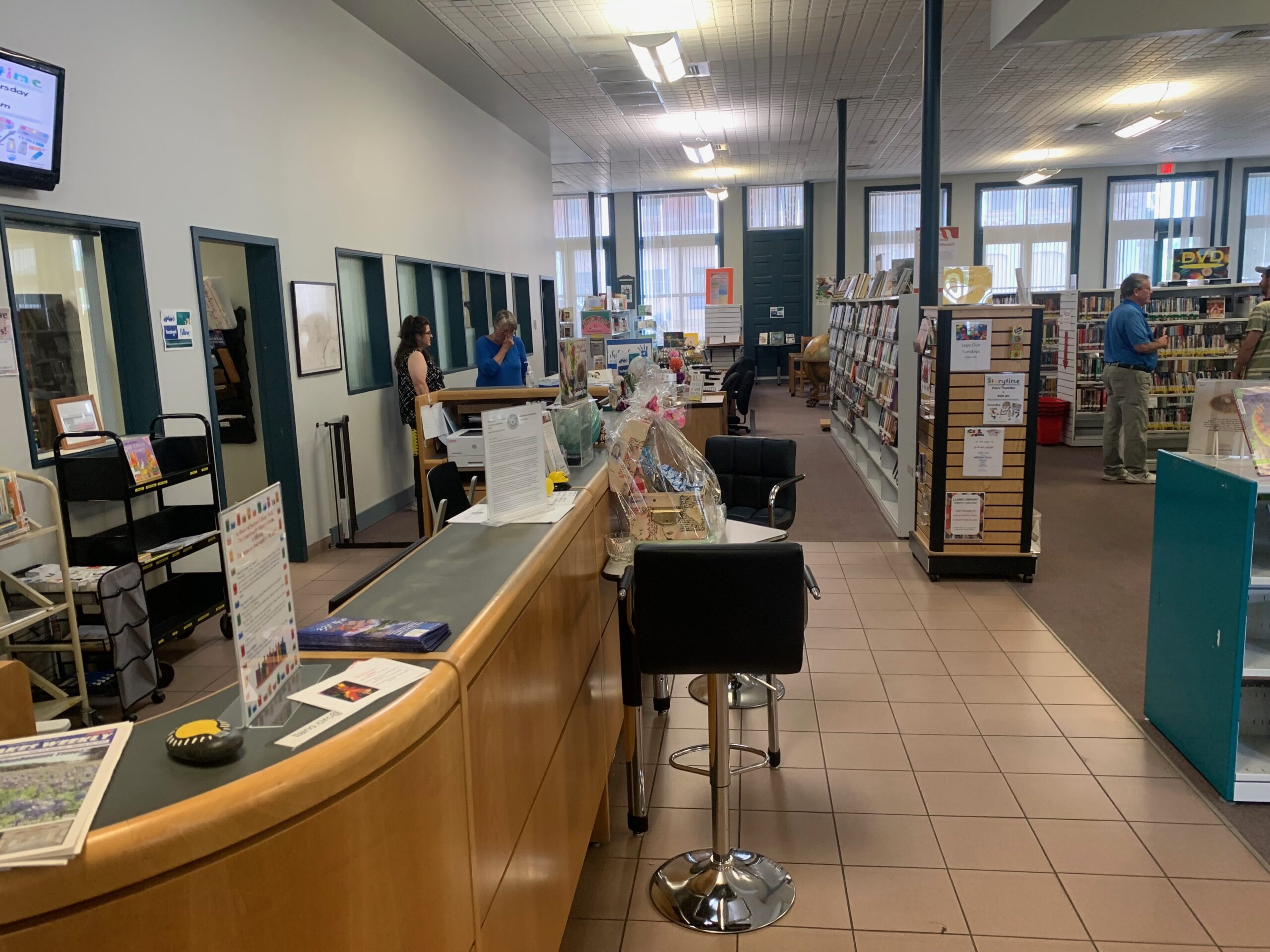
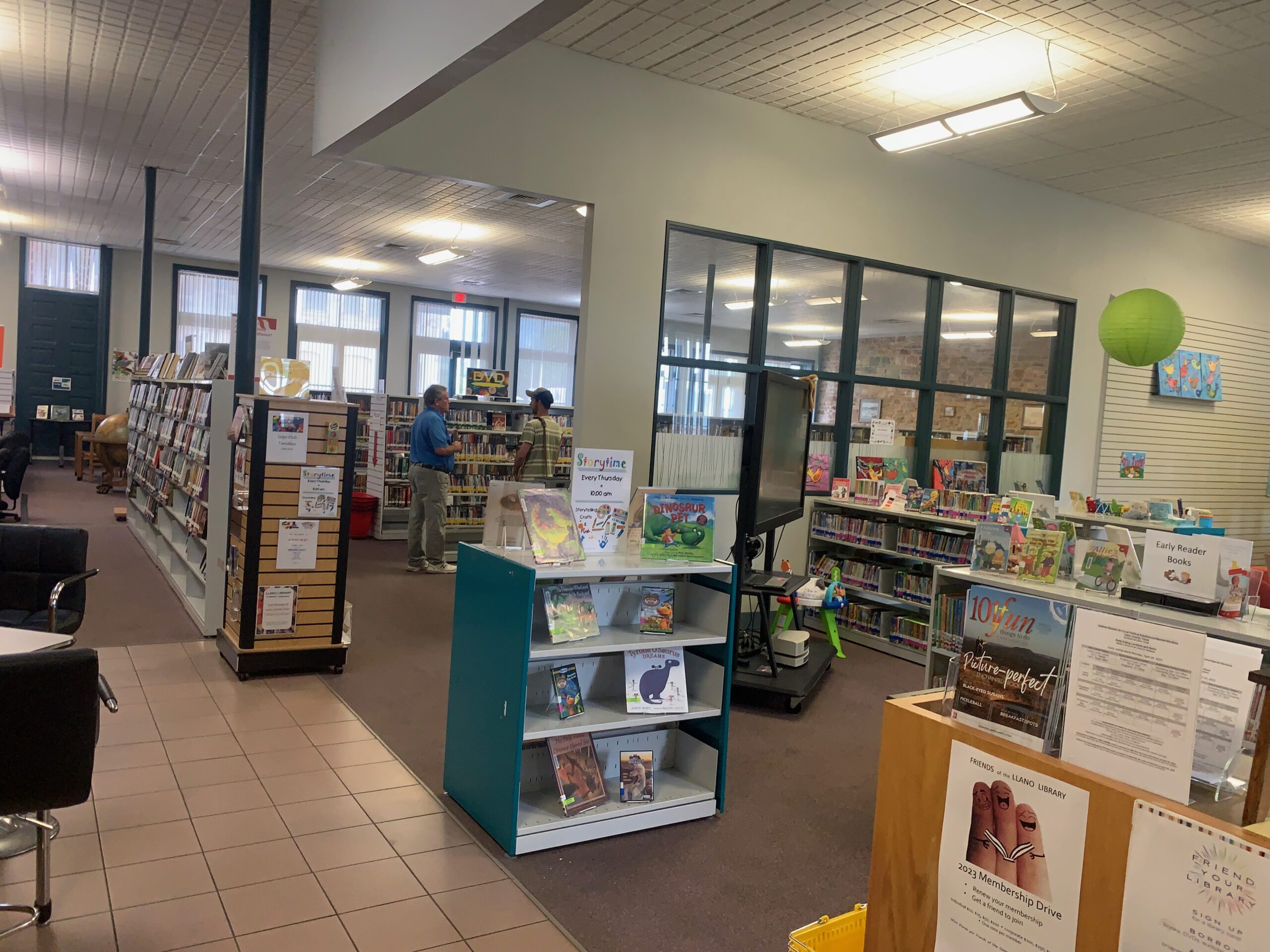
“I pulled them [the books on the list] and out of, like, 60 books I only weeded a handful because they weren’t being checked out. The people say I was censoring or banning books which isn’t true,” she said.
In April 2022, seven local people reacted to Milum’s action by initiating a legal action, at federal as opposed to State level, against the library and the authorities that administer all branches in the county. The lead plaintiff is Lelia Green Little, a speech and language psychologist who lives in the countryside about five miles outside Llano. She was out when I called in the hope of hearing, first hand, of her concerns and she did not respond to a message left on her phone.
However, her and her co-plaintiffs’ case, that the weeding of books based on their content or points of view — which Ms Milum denies was what guided her — is contrary to the US constitution’s First Amendment protection of free speech, has so far found favour with the judiciary. In March this year, a federal judge in Austin directed, in a preliminary ruling, that all 17 books be placed back on the shelves — and also every other book that has ever been removed because of its content. The library authorities are miffed that despite this preliminary ruling (which is being appealed), the main action by Little et al remains in play and will be heard in October.
Llano County’s library annual budget is $450,000 and so far, the authorities say the litigation has cost the county $100,000. The county faces the prospect, it maintains, of having to close all its libraries if staff cannot “weed” books, as they always have.
Earlier this month, the County Commissioners, who oversee the running of the libraries, met to decide if they had any option but to close them. In the event and after submissions from local people appealing for the libraries to stay open, they simply took the item off the agenda following legal advice. But in an angry statement afterwards, they hit out at the plaintiffs (“who is funding this civil litigation”? they asked) and the media, and they wondered aloud how long they could continue to fund the libraries and pay staff.
“A public library simply cannot function if its librarians, county judge, commissioners, and even volunteers who serve out of the goodness of their heart, can be sued every time a library patron disagrees with a librarian’s weeding decisions,” said the statement.
And that will be central to the case when it goes to full hearing in October. Was the weeding done prompted by State Congressman Krause and his community based supporters, foot soldiers in America’s cultural “war on woke” etc? Or was it carried out, unprompted and according to the weeding criterion of the American Library Association, merely to free up shelf space, as the County Commissioners claim? The US has a fairly long track record of steering clear of censorship, of eschewing anything that smacks of government trying to control what people can read.
Amber Milum comes across as someone who loves her job. Llano library is in an old single storey, red brick building that used to house the County Clerk’s office, with a modern extension and entrance out back. The open plan library is a welcoming place, with pods of armchairs and tables, a screen for watching videos, internet access, and rows of bookshelves. It is a place where book clubs meet and is very much rooted in the community — as is Ms Milum.
“I want people to come in here. I love my job and want everybody to find a book they like,” she says. Did she lose sleep over what was going on, I asked. “Oh yeah,” she replied, “the whole thing is so upsetting. It is not what our town is about — being mad at each other. Everybody should be able to have their opinions, their views and morals. Libraries can’t parent other people’s kids.”
Perhaps not surprisingly, but sadly nonetheless, Amber did not want to have her picture taken, lest publication draw further unwelcome attention down upon her and her colleagues. Back at Fuel Cafe, a young woman is rushed over to me by tie dye, who knows I am interested in the library row. The young woman, who did not want her name used let alone have her photo taken, is involved in the controversy, in a volunteering or advisory capacity, as it were. We chatted amiably about many things but she couldn’t really talk about the library controversy, especially not when I took out my notebook! Despite that, she, and everyone else involved or interested in the situation, was politeness itself.
But beneath the surface, behind the aura of charm and community chumminess, make no mistake: there is a seething anger over what appears from the outside to be a battle of wills over what people, adults and teens, should be allowed to read . . . and hence think. A tiny library in a small town in Texas may yet find a place in the legal annals of the United States when it comes to free speech, free access to information and the role of public employees.
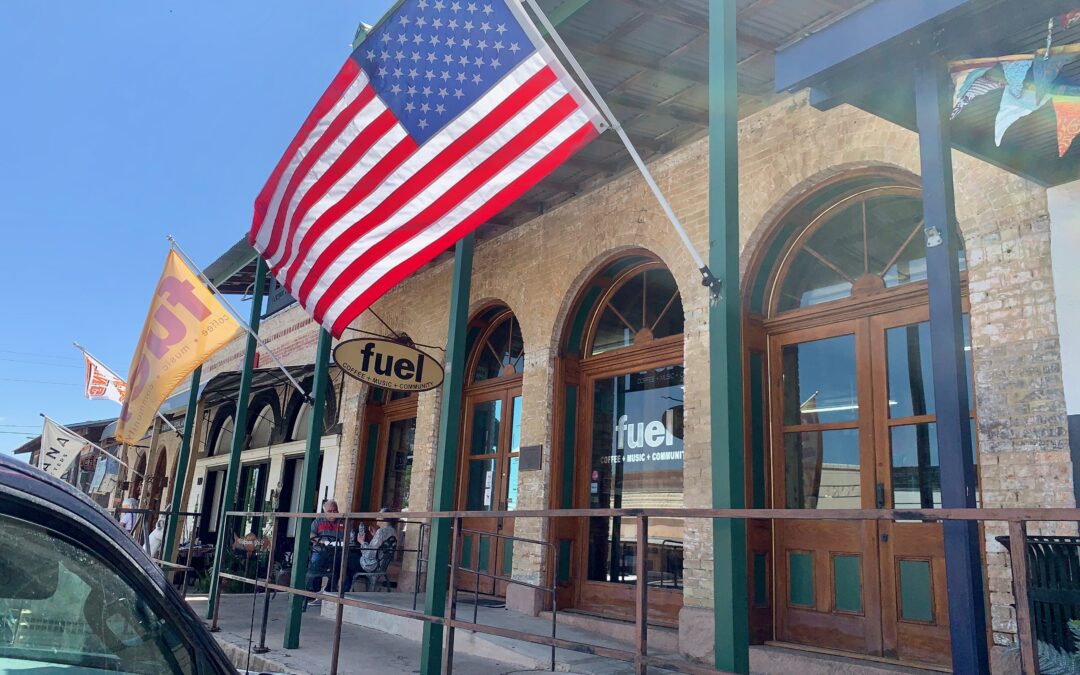
Excellent piece – again!
Great article Peter. Really brings the places you visit to life
Thank you!